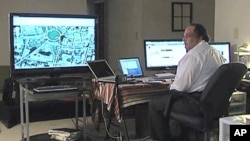For protesters in Tahrir Square, avoiding police arrest required a coordinated effort on the first day of demonstrations.....and it continues to. A man helping to instruct protesters how to do that is thousands of miles away in the United States, communicating through high tech. The Egyptian Embassy in Washington did not return our phone calls seeking comment. But he's a former Egyptian police officer and he says there's a price on his head.
In a personal command center in a tiny apartment, 10 minutes from Washington, D.C., the revolution gets direction.
"God be with you. You are the ones. We are representing nothing without you," Omar Afifi Suleiman tells a caller.
Suleiman is speaking to protesters in Egypt via Skype, Facebook, Twitter and cell phone. Today, he hears from the Egyptian countryside, where 200 want to join the revolt.
"Are our groups increasing in number," the caller asks.
"Of course they are," Suleiman responds.
Another man calls after being questioned by authorities.
"The first thing they did was let us hear the sound of electric shock to intimidate us," the protester tells him.
Suleiman briefs activists on how to prevent confrontation. After 20 years as an Egyptian police officer, he says he knows all about that.
He wrote a book instructing ordinary citizens how to avoid police abuse. The book was banned in Egypt and Suleiman says death threats forced him out of the country - to America where he says he's been waiting three years to start a revolution.
"Our demonstrations will be popular, spontaneous, and peaceful. One hundred percent. No violence.," he says.
On January 14, Suleiman's YouTube video directed thousands on where and how to begin a revolt. He says he joined three other groups helping to organize protestors. It began 11 days later.
Suleiman says he taught protesters how to outsmart police by gathering in the side streets leading toTahrir Square.
"I know the police and he can control for 500, 600, 700," he notes. "But he can't control for 1,000 and 500. It's very hard."
Suleiman says he wants what the protesters want: President Mubarak's resignation and democracy now.
"Nobody can stop our revolution. Nobody," he insists.
But Egypt's Vice President Omar Suleiman -- no relation -- said the government will not tolerate prolonged protests in Tahrir Square, where some have set up tents. He was quoted saying he does not want to deal with Egyptians using "police tools."
Under a new government, analysts say that same police department would have to adapt.
"You have to change a whole police culture, you have to train them that slapping people around doesn’t work," says Fouad Ajami, a Mideast expert with Johns Hopkins University. "That kicking people around doesn’t work”"
Omar Affifi Suleiman agrees and estimates one out of seven Egyptian police officers is corrupt and abusive. He says only through retraining can the force establish credibility with the Egyptian public.
Former Egyptian Police Officer Directs Protesters from Afar




